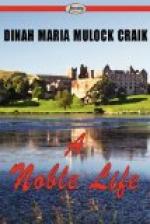Helen Bruce resisted no more. She could not. She was a wise woman— a generous and loving-hearted woman; still, in that self-contained, solitary existence, which had been spent close beside her, yet into the mystery of which she had never penetrated, and never would penetrate, there was a nearness to heaven and heavenly things, and clearness of vision about earthly things which went far beyond her own. She could not quite comprehend it—she would never have thought of it herself —but she dimly felt that the earl’s judgment was correct, and that, strange as his conduct might appear, he was acting after that large sense of rightness which implies righteousness; a course of action which the world so often ridicules and misconstrues, because the point of view is taken from an altitude not of this world, and the objects regarded there-from are things not visible, but invisible.
Cardross appeared next day—not at home, but at the Castle, and was closeted there for several hours with the earl before he ever saw his mother. When he did—and it was he who came to her, for she refused to take one step to go to him—he flung himself on his knees before her and sobbed in her lap—the great fellow of six feet high and twenty years old—sobbed and prayed for forgiveness with the humility of a child.
“Oh, mother, mother—and he has forgiven me too! To think what he has done for me—what he is about to do—me, who have had no father, or worse than none. Do you know, sometimes people in Edinburgh —the Menteiths, and so on—have taunted me cruelly about my father?”
“And what do you answer?” asked Helen, in a slow, cold voice.
“That he was my father, and that he was dead; and I bade them speak no more about him.”
“That was right, my son.”
Then they were silent till Cardross burst out again.
“It is wonderful—wonderful! I can hardly believe it yet—that we should never be poor nay more—you, mother, who have gone through so much, and I, who thought I should have to work hard all my days for both of us. And I will work!” cried the boy, as he tossed back his curls and lifted up to his mother a face that in brightness and energy was the very copy of her own, or what hers used to be. “I’ll show you, and the earl too, how hard I can work—as hard as if for daily bread. I’ll do every thing he wishes me—I’ll be his right hand, as he says. I will make a name for myself and him too—mother, you know I am to bear his name?”
“Yes, my boy.”
“And I am glad to bear it. I told him so. He shall be proud of me yet, and you too. Oh, mother, mother, I will never vex you again.”
And once more his voice broke into sobs, and Helen’s too, as she clasped him close, and felt that whatever God had taken away from her, He had given her as much—and more.
Mother and son—widowed mother and only son—there is something in the tie unlike all others in the world—not merely in its blessedness, but in its divine compensations.




